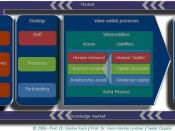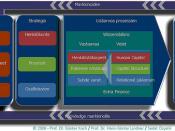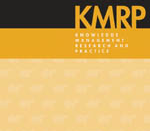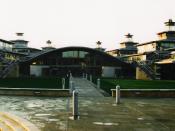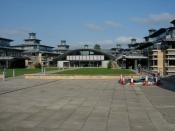Are The Soft Sciences Really Scientific ? The word science originally came from the Latin word scio- to know. This suggests that sciences are a subject in which all answers are facts i.e. pure knowledge with proof to back them and no insinuations. This must be thought of as meaning that things are only scientific if they have figures and tried and tested theories to back them up. It was long ago accepted that Mathematics was the Queen of the sciences in that all things in mathematics have a logical reasoning found purely in the behaviour of numbers and therefore are not based on any form of human intervention. After mathematics comes Physics a science also based around the study of numbers, this time applied ,however, to the real world. This margin for human error by experiment already moves it away from the purely scientific as there is room for assumption to become knowledge without any mathematical or pure knowledge backing it up.
Already we come to the difference between knowledge and belief. Though at least in physics we believe that all that we learn is true it is quite possible that in a few years time we will have to change our view of the subject as more information comes to light. Already there is a margin of uncertainty left that is not present in mathematics.
The list of 'sciences carries on from most scientific downwards, first chemistry then biology. Already in biology we see many elements of the physical world being brought in. These elements can not be accurately measured and so approximations or 'guesses' must be made. These lead again to 'knowledge' of things that though they are backed up by evidence the evidence itself may be false as it has no real knowledge on which to base the occurring results. Though something is known because it has many times been proven to be true we must actually see this as a belief as it has no absolute certainty and knowledge to back this up.
Once we get to the human sciences any quantities are based on numbers that are approximations at best and generally just an accepted way of showing a certain result without any real knowledge to back them up. Also the human sciences are focused on how to predict the behaviour of an individual, by the nature of their applicability to a wide spectrum of people they ,must obviously be wrong sometimes. This shows how any results obtained can only be a generalisation, not applicable in small groups and also how much they are not based on knowledge but accepted beliefs that no one is questioning not due to knowledge but belief.
These subjects fill in a gap that is left between the humanities like history and the purer sciences like mathematics and physics, this means that they do not fully fit into either group, sometime the basis for a theory or result is based on knowledge but hen again a lot of the time it is not this leads to the question asked. Therefore we must say that though not always scientific the soft sciences try to quantify concepts left out by the other sciences and humanities and as such must be regarded as both as well as not purely either.
